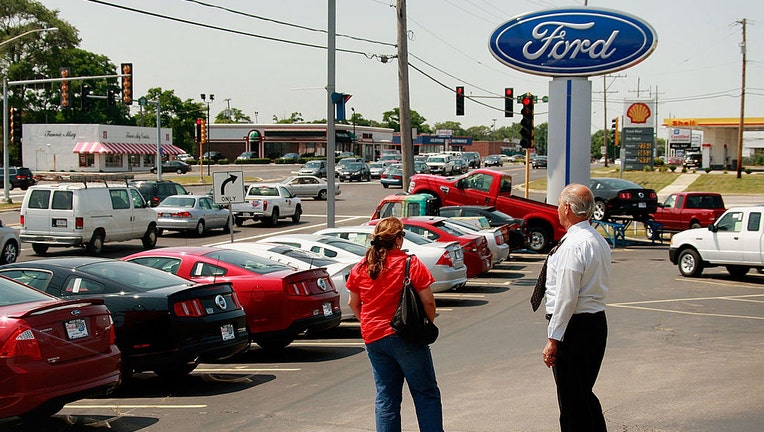Auto tariffs are now in effect: Here's what it means for people buying a car

FILE-A salesperson helps a customer at a Ford dealership in Downers Grove, Illinois. (Photo by Scott Olson/Getty Images)
President Donald Trump’s auto tariffs went into effect Thursday. The 25% tariffs apply to imported cars to the U.S. and Trump also plans to extend the tariffs to cover car parts, which likely will increase the cost of repairs and insurance.
These tariffs are also expected to extend to applicable auto parts in the coming weeks, through May 3.
RELATED: Should Americans rush to buy a car before the tariffs? Here's what Trump says
How do auto tariffs impact car buyers?
Why you should care:
The tariffs on autos will start being collected on Thursday and if the taxes are passed onto car buyers, the average car price on an imported vehicle could spike $12,500.
According to the Wall Street Journal, if tariffs raise car prices, a new-car payment could absorb roughly 15% of a monthly budget.
RELATED: Trump imposes 25% tariff on imported cars: 'This is permanent'
CNN reported that less supply for cars can mean higher prices, and the auto tariffs mean that there may potentially be millions of fewer new cars available for sale. And the higher prices in the new car market may compel consumers to consider buying used cars, boosting demand.
Citing industry data, the Wall Street Journal reported that roughly half of the cars sold in the U.S. are imported, which is about seven million cars, trucks and SUVs purchased by consumers.
With car prices likely to rise with the auto tariffs, automakers and parts manufacturers can cover some of the added costs and they are likely to pass some price increases to consumers.
Trump auto tariffs
The backstory:
President Trump is placing 25% tariffs on auto imports, a move that the White House believes could boost domestic manufacturing. However, it may place a financial strain on auto manufacturers that depend on global supply chains.
When Trump first announced the new auto tariffs in March, he suggested that he would like to provide a new incentive to help car buyers by allowing them to deduct from their federal income taxes the interest paid on auto loans, so long as their cars were made in America.
RELATED: Trump signs tariff order; Mexico and Canada retaliate
According to the Associated Press, the auto tariffs are part of a broader reshaping of global relations by Trump, who imposed "reciprocal" taxes on April 2 to match the tariffs and sales taxes charged by other nations.
The new tariffs would apply over time to both finished autos and parts used in the vehicles, a White House official who spoke on condition of anonymity to discuss the taxes on a call with reporters in March.
What the auto tariffs mean for car manufacturers
Dig deeper:
Citing S&P Global Mobility, CNBC reported that Volvo, Mazda, Volkswagen, and Hyundai Motors are the most at risk from a vehicle standpoint, as at least 60% of their U.S. sales were imported from outside the U.S. last year.
Ford, General Motors, Toyota Motor, Honda Motor, and Chrysler parent Stellantis manufactured the most cars in the U.S., according to S&P Global Mobility. These auto manufacturers accounted for 67% of U.S. passenger light-car production in 2024.
The Source: Information for this story was provided by the Associated Press, Wall Street Journal, CNN, CNBC, USA Today, and previous LIVENOW from FOX reporting. This story was reported from Washington, D.C.

